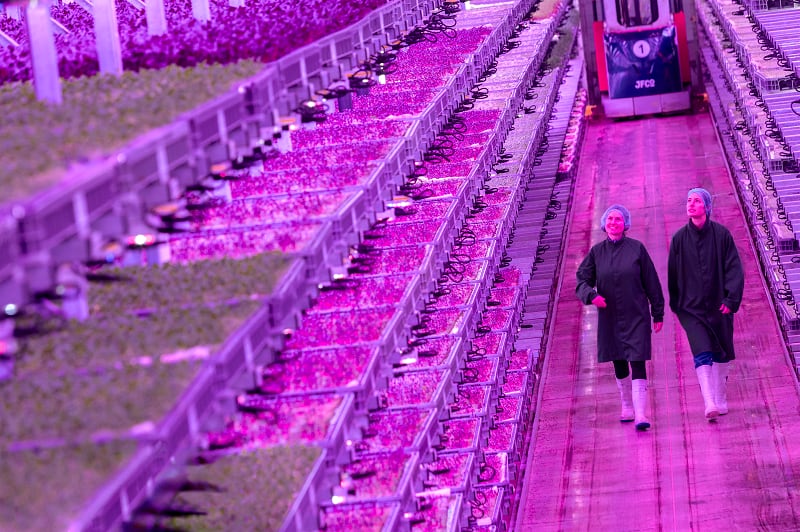Agri-tech is set to accelerate innovation and growth in the UK’s agriculture and food industries, as over half of UK food industry businesses (51%) say adopting new technologies is a key business priority as they look ahead to the next five years, while one in four (25%) agriculture business leaders say it’s a top priority. Nearly half of decision-makers in the combined agri-food industries (48%) say there are stages in their supply chain where innovation or investment are lacking.
An adoption pathway for commercial solutions
The UK Agri-Tech Centre is the UK’s largest independent agri-tech organisation. It began operations from April 1 2024 following the merger of three existing Agri-Tech Centres, the Centre for Innovation Excellence in Livestock, Centre for Crop Health and Protection and Agri-EPI.
The UK Agri-Tech Centre will:
- Support the UK economy
- Drive responsible agri-innovation at unprecedented levels, securing society’s supply of food, fuel and fibres and stimulating economic growth for the UK and beyond.
- Address global challenges
- Strengthen connections between science, business and funders to accelerate R&D that overcomes the agri-industry’s most critical challenges, such as climate change, labour issues, disease mitigation and environmental sustainability
- Deliver knowledge and networks
- Connect businesses to world-class knowledge, funding, expertise, facilities and collaborators that will save time and accelerate progress
- Provide independent leadership
- Be an independent entity that the entire agri-systems supply chain can trust for leadership and guidance on progressing transformational change that benefits society and the planet
The findings are from the new Future of Agri-Tech report that surveyed 200 R&D and technology decision-makers in the agriculture and food industries to mark the launch of the new UK Agri-Tech Centre, the UK’s largest dedicated agri-tech organisation. The UK Agri-Tech Centre commissioned the research to better comprehend agri-food businesses’ priorities in order to inform its strategy to drive agri-innovation at unprecedented levels.
Established by the UK’s innovation agency, Innovate UK, the UK Agri-Tech Centre offers a complete life-cycle of support, driving agri-tech innovation and adoption through world-class facilities, expert knowledge and business support.
Appetite to explore new technologies including AI and machine learning
Growth and expansion of their core business is the key business priority for 58% of agriculture and food business leaders over the next five years, followed by becoming more sustainable (40%), according to the report.
In line with their key business priorities, 40% of agri-food businesses want to explore new technologies relating to sustainable production, 38% food security and 31% resilient food systems.
Twenty-eight percent of agri-food industries want to explore the potential of AI and machine learning to support their business. Just over one in four (26%) agri-food businesses want to explore robotics and automation.
Historic lack of access to funding has hindered tech innovation and adoption
The research found that access to funding is the biggest hurdle to developing and implementing new technologies for the agri and food industries, with four in 10 (39%) R&D and technology leaders saying this has been a key challenge. This is followed by a lack of resource and time (38%) and attracting investment (27%) as the top three most common barriers to agri-tech development and adoption.
Case studies at the centre include the Breed for CH4nge project, which will measure methane emissions from a total of 13,500 sheep in 45 flocks. It will then collect the necessary data and build and develop the tools required to genetically reduce sheep farming methane emissions and improve the efficiency of the national flock.
Another is project is tackling labour shortages, climate change, and increasing pressure on productivity in agriculture via a novel crop scouting robot applied on strawberry and apple farms. The data collected from the robot aims to transform a grower’s business with accurate and affordable yield estimation, real-time crop management, and increased efficiency of labour and resources. Another project is developing a sustainable zero-waste, on-farm slurry management system to transform dairy slurry into valuable by-products.
UK Agri-Tech Centre CEO Phil Bicknell said: “Agri-tech can unlock solutions to many of the major issues facing the agriculture and food sector and the UK’s food security challenges. As the UK’s largest agri-tech organisation, we can now help more businesses access funding and play a key role in de-risking investment for private funders by strengthening the connections between science and R&D to deliver an adoption pathway for commercial solutions.
“Through focusing on key strategic themes of innovation for resilient systems, sustainable production, one health and intelligent agriculture, and by taking a systems-wide approach and creating greater cross-sector working opportunities and collaboration, we believe that agri-tech can ultimately secure the UK’s supply of food, fuel and fibres and stimulate economic growth.”




